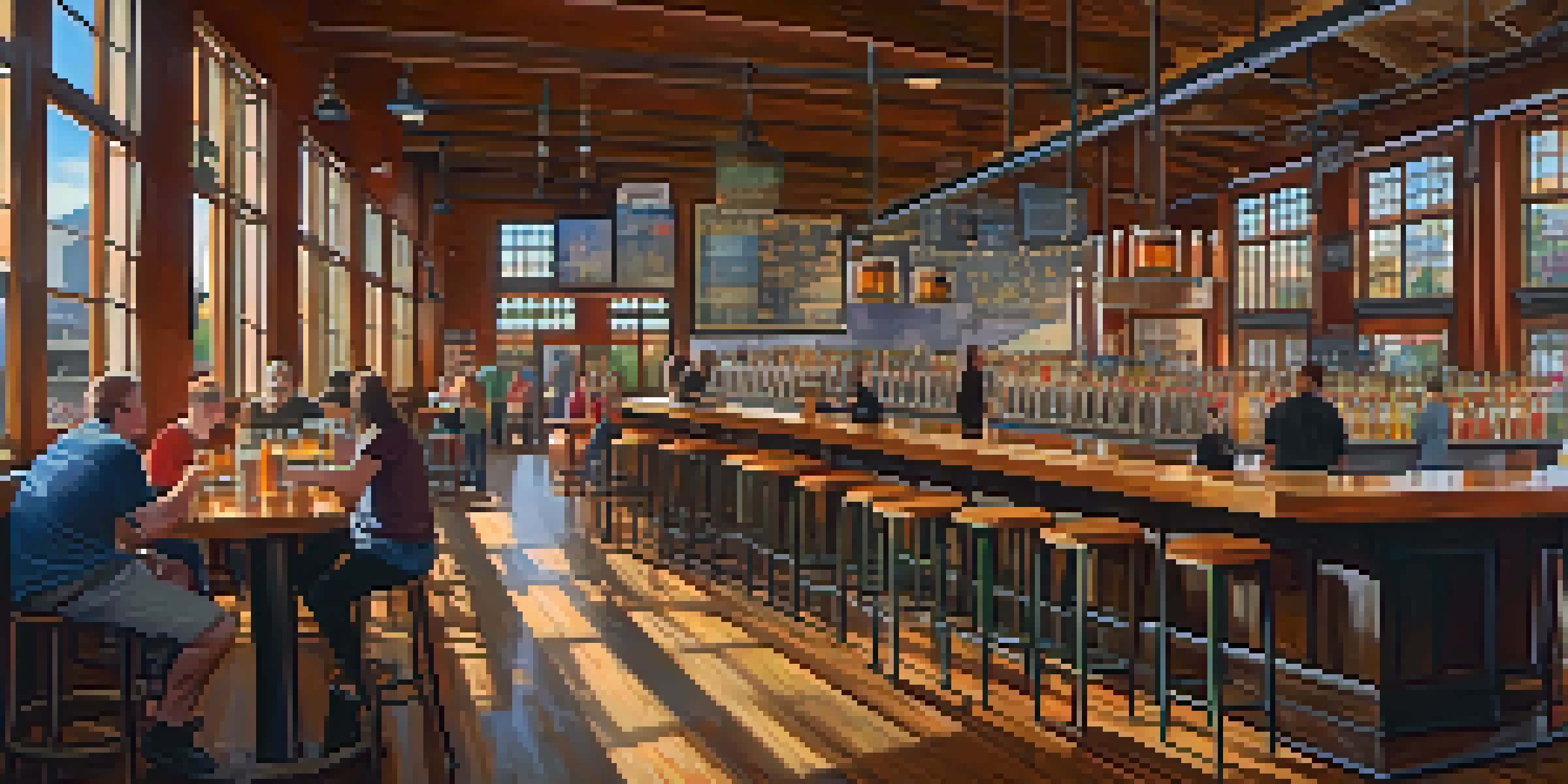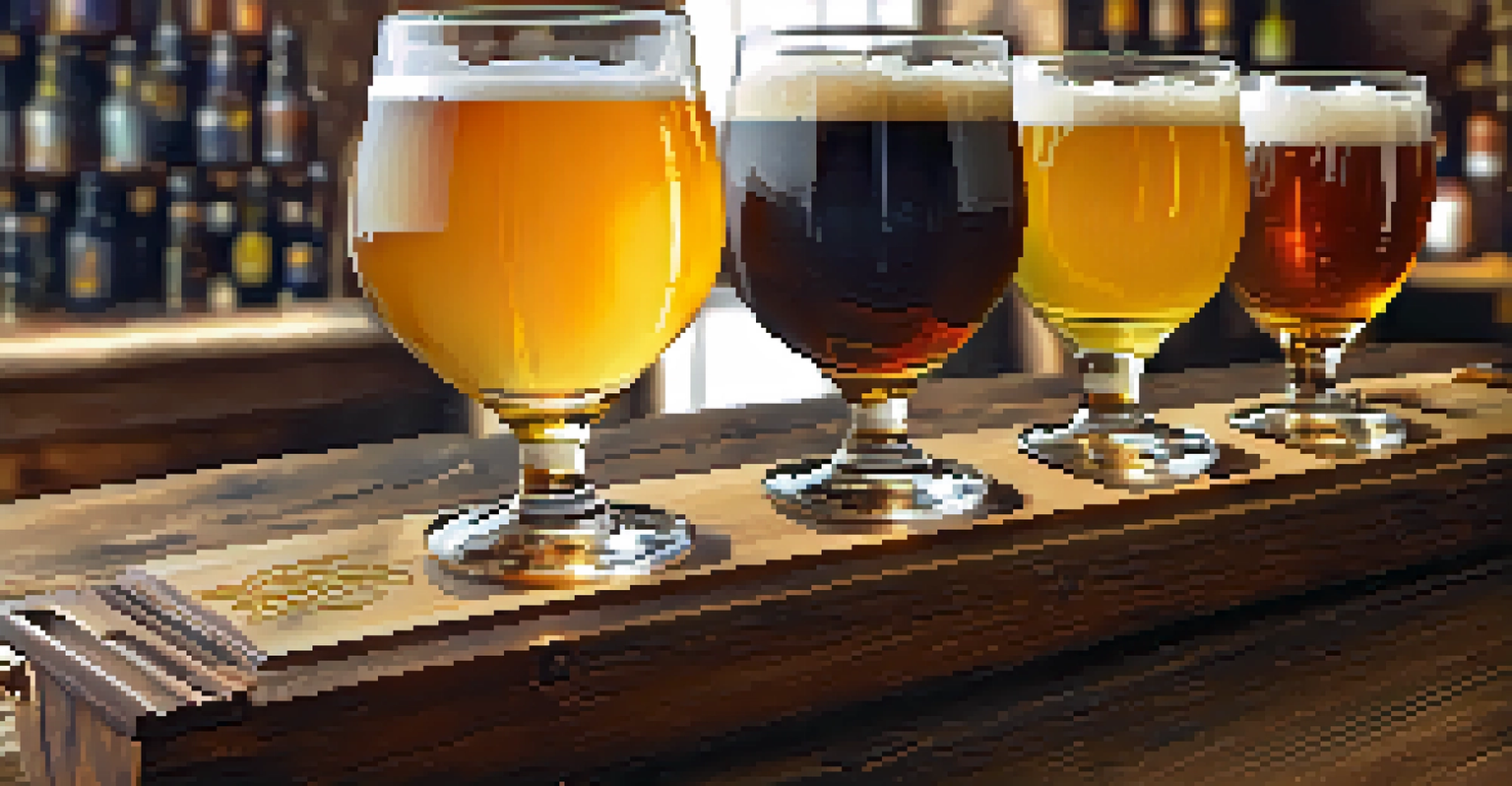The Future of Craft Beer in Portland: Trends and Predictions

The Rise of Innovative Brewing Techniques in Portland
As craft beer enthusiasts continue to seek unique flavors, innovative brewing techniques are becoming increasingly popular in Portland. This trend includes experimenting with wild yeasts, barrel-aging, and incorporating local ingredients, such as fruits and herbs. For example, some breweries have started using foraged botanicals to create one-of-a-kind brews that reflect the rich biodiversity of the Pacific Northwest.
Good beer is a journey; it’s about the craftsmanship and the local ingredients that make it unique.
Moreover, advancements in technology are enabling brewers to fine-tune their processes, resulting in more consistent and diverse flavor profiles. Breweries are investing in state-of-the-art equipment that allows for precise temperature control and fermentation management. This not only enhances the quality of the beer but also opens the door for even more creativity in flavor combinations.
As these innovative techniques gain traction, Portland's craft beer scene is poised to become a beacon for both local and out-of-state beer lovers. With a commitment to pushing boundaries, local breweries are not just following trends but setting them, ensuring that the city remains at the forefront of the craft beer movement.
Sustainability: A Core Value for Future Breweries
Sustainability has become a central focus for many Portland breweries, reflecting a broader societal shift towards eco-consciousness. Many breweries are now implementing practices such as using renewable energy, recycling waste, and sourcing ingredients from local farms. This not only helps reduce their carbon footprint but also resonates with consumers who prioritize environmentally friendly products.

For instance, some breweries have adopted innovative water recycling systems that allow them to reuse water throughout the brewing process. Others are partnering with local farms to repurpose spent grains as animal feed, creating a closed-loop system that benefits both the brewery and the community. This commitment to sustainability is becoming a significant selling point for consumers who want to support businesses that align with their values.
Innovative Brewing Techniques Rise
Portland breweries are embracing unique brewing methods, such as wild yeasts and local ingredients, to create distinct craft beers.
As sustainability continues to shape the craft beer landscape, Portland's breweries are leading the charge. By prioritizing eco-friendly practices, these establishments are not only appealing to a growing market of conscious consumers but also setting an example for other industries to follow.
The Impact of Craft Beer Culture on Local Communities
Portland's craft beer culture has become a vital aspect of its local communities, fostering connections and camaraderie among residents. Breweries often serve as community hubs, hosting events, food trucks, and live music, which encourages social interaction and local engagement. This sense of community not only supports the breweries but also strengthens the fabric of Portland's neighborhoods.
Sustainability isn’t just a trend; it’s a necessity for the future of our planet and our breweries.
Moreover, the craft beer scene has opened doors for local artists and entrepreneurs, providing them with a platform to showcase their talents. From art installations to pop-up markets, breweries are collaborating with local creatives to enhance the overall experience for patrons. This symbiotic relationship enriches both the beer culture and the local economy, making Portland a vibrant place for innovation.
As the craft beer scene continues to evolve, its influence on local communities will only grow stronger. With breweries committed to supporting their neighborhoods, Portland is set to become an even more dynamic city where craft beer and community spirit coexist harmoniously.
The Role of Technology in Craft Beer Production
Technology is playing a pivotal role in the evolution of craft beer production, from brewing to marketing. Breweries are increasingly adopting software tools that allow them to track inventory, manage recipes, and analyze consumer preferences. This data-driven approach not only streamlines operations but also enables brewers to respond quickly to market demands and trends.
In addition, the rise of e-commerce platforms has transformed how breweries sell their products. Many local breweries have developed their online stores, allowing customers to purchase beer directly from the source. This shift not only enhances convenience for consumers but also provides breweries with valuable insights into purchasing habits and preferences.
Sustainability Drives Brewery Practices
Many breweries in Portland are prioritizing eco-friendly practices, like using renewable energy and recycling waste, to align with consumer values.
As technology continues to advance, Portland's craft beer scene will likely see even more innovative solutions that enhance both production efficiency and customer experience. Embracing these technological changes will be essential for breweries looking to stay competitive in an ever-evolving market.
Craft Beer Tourism: A Growing Trend in Portland
Craft beer tourism is on the rise in Portland, attracting visitors from around the country and beyond. With its numerous breweries, beer festivals, and tasting events, the city has become a destination for beer enthusiasts looking to explore diverse flavors and styles. This influx of tourists not only boosts the local economy but also helps to further elevate Portland's reputation as a craft beer capital.
Breweries are capitalizing on this trend by offering guided tours, tastings, and unique experiences that showcase their brewing processes. Many are also collaborating with local hotels and restaurants to create beer-focused packages that provide visitors with a comprehensive experience of Portland's craft beer culture. This collaboration enhances the overall appeal of the city as a tourist destination.
As craft beer tourism continues to flourish, Portland's breweries will need to adapt and innovate to meet the growing demand. By creating memorable experiences for visitors, they can ensure that the craft beer scene remains vibrant and continues to attract new fans.
The Influence of Local Ingredients on Craft Beer Flavors
The farm-to-table movement has made its way into the world of craft beer, with many Portland breweries focusing on using locally sourced ingredients. This commitment to local sourcing not only supports regional farmers but also allows brewers to create unique flavors that reflect the essence of the Pacific Northwest. From hops to fruits, the use of local ingredients adds a distinctive character to the beers produced in the area.
For example, some breweries are experimenting with seasonal fruits and herbs to craft limited-edition brews that highlight the region's agricultural bounty. This approach not only excites the palate but also fosters a deeper connection between consumers and the local landscape. As beer drinkers become more adventurous, the demand for these innovative flavors will likely continue to grow.
Craft Beer Tourism Boosts Economy
The rise of craft beer tourism in Portland is attracting visitors and enhancing the city's reputation as a craft beer destination.
By embracing local ingredients, Portland's breweries are not only contributing to the local economy but also enriching the overall craft beer experience. This trend will likely play a significant role in shaping the future of craft beer, as consumers increasingly seek authentic and regionally inspired flavors.
The Evolution of Beer Styles and Consumer Preferences
As the craft beer movement matures, the evolution of beer styles and consumer preferences is becoming increasingly evident. Portland's breweries are constantly experimenting with new styles, from sour ales to IPAs and everything in between. This willingness to push the boundaries of traditional brewing is attracting a diverse audience, including both seasoned beer aficionados and newcomers to the scene.
Moreover, consumer preferences are shifting toward lower-alcohol and sessionable beers, reflecting a growing interest in moderation without sacrificing flavor. Breweries are responding by crafting lighter styles that are still packed with taste, catering to those who want to enjoy a beer without the heavy effects. This trend is making craft beer more accessible to a broader range of drinkers.

As tastes continue to evolve, Portland's craft beer scene will likely remain dynamic and ever-changing. With breweries committed to staying ahead of trends and listening to consumer feedback, the future looks bright for this vibrant industry.